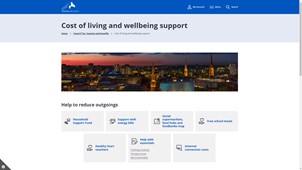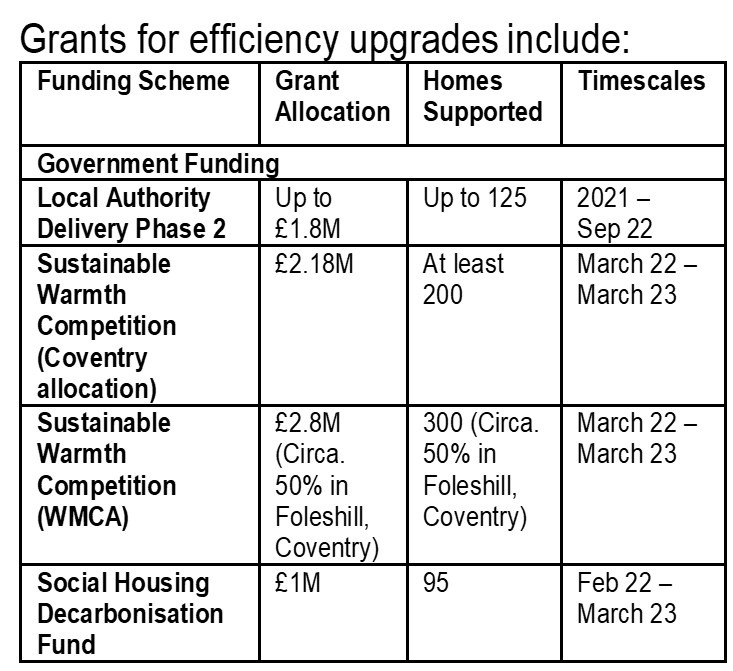Affordable access to heating, and insulation
Increase in the cost of living
A cost-of-living crisis started in the second half of 2021 and is rapidly accelerating in first half of 2022. While this is primarily around energy, fuel for vehicles, and food - it is severely affecting all areas of spending and debt levels. Other areas of concern are mental and physical health, the cost of physical access to services (private and public transportation), and the cost of digital access to services. Therefore, there are ongoing risks to access to; energy, warmth, food, benefits, healthcare, and other services.
Coventry City Council have created a web page that pulls together all of the existing support that is available to the people of Coventry, particularly in regards to the cost-of-living crisis: https://www.coventry.gov.uk/cost-living-wellbeing-support
Housing energy performance
Energy performance certificates (EPC) are the standard measure of UK property efficiency. EPCs have been lodged for 729 homes as new dwellings in 2021/22. Of these 6 (<1%) were Efficiency Band A, 494 (68%) were Band B, 191 (26%) were Band C, and 38 (5%) were Band D. Zero were Band E, F or G. This is below the long-term average of 75% Band B and 21% Band C for the efficiency of new build properties in Coventry.
For all EPCs in Coventry in 2021/22 50% were Band D, and 48% were Band C. Properties that were built before 1967, and are band D on their current EPC, still account for 46,314 (52%) of the 88,806 total properties with an EPC in Coventry. 15,268 of these are listed as rentals, and of those 5,321 are listed as social housing. Social housing has more Band C (6,735) than Band D (5,321). Private rentals have similar numbers of Band C and Band D. Homes marketed for sale in Coventry are still predominately Band D. However, the ratio of Band D to Band C is improving. It was 1.6 for EPCs lodged in 2021/22 (1,735 vs. 1,071), whereas the long-term ratio is 2.3 (19,507 vs. 8,432).
Improving the energy efficiency of housing
The Council is helping homeowners improve the energy efficiency of homes. Newly issued EPCs provide one way in tracking progress. For EPCs issued in 2021/22 related to energy efficiency upgrade schemes, 678 EPCs in 21/22 were for the Energy Company Obligation (ECO) bringing the total to 7,508; 22 were for a Green Deal assessment bringing the total to 4,965; 14 were for a Renewable Heat Incentive application bringing the total to 69; and 1 was for a Feed in Tariff (FiT) application bringing the total to 1,617. These schemes were largely inactive nationally in 2021/22, nonetheless there is significant support in place for 2022/23. The Council-run domestic retrofit schemes have increased EPC ratings by 1-2 bands on average.
Foleshill in Coventry, alongside Elmdon in Solihull, has been selected as one of the place-based local areas to share the first £2.8M (circa 50% for Foleshill) of the £19M Sustainable Warmth Competition Funding awarded to the WMCA. The aim of the funding is to reduce domestic energy use by installing the latest fuel-reducing technology free-of-charge to eligible households who apply. 150 homes in Foleshill will benefit from the scheme in this round, with plans to roll out the scheme to a further 1,700 homes across the combined authority in the future.
This initiative is running alongside the Council’s own domestic retrofit projects which can support low income/low EPC rated household applicants across the city. This is with the aim to reduce residents’ fuel bills, as part of the Government’s ambitious plans to support as many homes as possible to have an energy performance rating of A to C.
Coventry City Council, in partnership with Act on Energy, a charity, also run a Keeping Coventry Warm scheme. This scheme provides a variety of support for Coventry residents, including referrals for these and other grants towards insulation, solar photovoltaic panels, and other energy efficiency measures. They can also support with bill advice, tariff switching, and onwards referrals to other agencies if appropriate. Homeowners interested in free energy efficiency measures can contact Act on Energy, who will check eligibility, and provide support through the application process.




